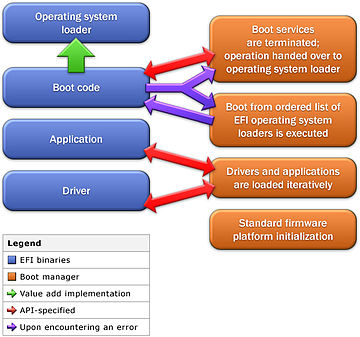- Joined
- Jan 3, 2009
- Messages
- 2,605
- Points
- 0
The computer boot up - the next generation
Wave goodbye to BIOS and say hello to UEFI
Those frustrating boot-up moments while we wait an absolute age for our computers to load up are set to get somewhat shorter with the impending retirement of system BIOS. Despite now being a very old technology and relatively stuck in its ways, the BIOS is still found in many modern machines. Instead of taking around 25 - 30 seconds before giving the all-clear for an operating system to start, a new kid on the block is well on its way to offering instant-on.
It's not quite there yet, but the Unified Extensible Firmware Interface (UEFI) is getting closer.
The system boot upgrade comes in the form of UEFI, which is currently up to version 2.3 and is said to break the ties of being based on the specifications and design of old technology.
The Forum overseeing its development includes eleven industry leaders and says it "will provide a clean interface between operating systems and platform firmware at boot time."
UEFI started life as an Intel specification but has now changed into a general standard that offers similar boot and runtime services as the BIOS, but has the advantage of not being specifically tied to any processor architecture. It also has a different approach to dealing with the process of identifying and activating hardware prior to handing over to the OS.
For example, instead of telling the operating system that there's a mouse attached to a specific port, UEFI simply recognizes that somewhere in the machine there's a device that behaves like a mouse.
The future-proof standard is already being used in some devices, with 2011 being earmarked as the tipping point for machine domination. More information on UEFI is available from the Forum's website.
Wave goodbye to BIOS and say hello to UEFI
Those frustrating boot-up moments while we wait an absolute age for our computers to load up are set to get somewhat shorter with the impending retirement of system BIOS. Despite now being a very old technology and relatively stuck in its ways, the BIOS is still found in many modern machines. Instead of taking around 25 - 30 seconds before giving the all-clear for an operating system to start, a new kid on the block is well on its way to offering instant-on.
It's not quite there yet, but the Unified Extensible Firmware Interface (UEFI) is getting closer.
The system boot upgrade comes in the form of UEFI, which is currently up to version 2.3 and is said to break the ties of being based on the specifications and design of old technology.
The Forum overseeing its development includes eleven industry leaders and says it "will provide a clean interface between operating systems and platform firmware at boot time."
UEFI started life as an Intel specification but has now changed into a general standard that offers similar boot and runtime services as the BIOS, but has the advantage of not being specifically tied to any processor architecture. It also has a different approach to dealing with the process of identifying and activating hardware prior to handing over to the OS.
For example, instead of telling the operating system that there's a mouse attached to a specific port, UEFI simply recognizes that somewhere in the machine there's a device that behaves like a mouse.
The future-proof standard is already being used in some devices, with 2011 being earmarked as the tipping point for machine domination. More information on UEFI is available from the Forum's website.




